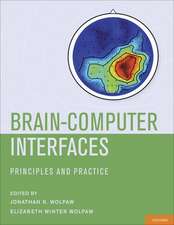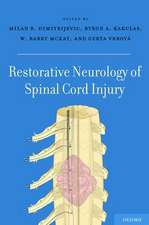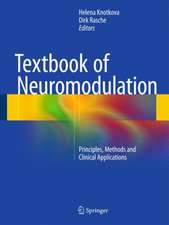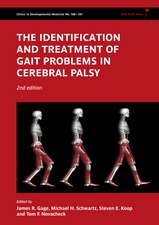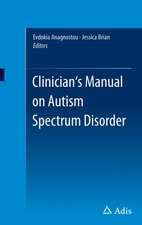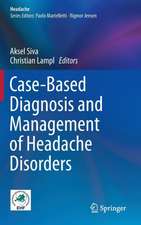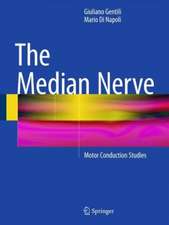Kindling 6: Advances in Behavioral Biology, cartea 55
Editat de Michael E. Corcoran, Solomon L. Moshéen Limba Engleză Hardback – 26 iul 2005
The Kindling Conferences and the books arising from them (Kindling, Kindling 2-Kindling 5) have provided valuable summaries of the ongoing research on seizure development, with an emphasis on mechanisms, consequences, and potential treatments that might offset epileptogenesis. The general themes of talks and chapters at the Sixth Conference on Kindling are: pathogenesis, behavioral effects, drugs and interventions against kindling, and clinical relevance.
| Toate formatele și edițiile | Preț | Express |
|---|---|---|
| Paperback (1) | 1827.32 lei 6-8 săpt. | |
| Springer Us – 19 noi 2010 | 1827.32 lei 6-8 săpt. | |
| Hardback (1) | 1830.49 lei 6-8 săpt. | |
| Springer Us – 26 iul 2005 | 1830.49 lei 6-8 săpt. |
Din seria Advances in Behavioral Biology
- 5%
 Preț: 368.00 lei
Preț: 368.00 lei -
 Preț: 401.79 lei
Preț: 401.79 lei -
 Preț: 406.63 lei
Preț: 406.63 lei - 15%
 Preț: 649.54 lei
Preț: 649.54 lei -
 Preț: 387.20 lei
Preț: 387.20 lei -
 Preț: 405.28 lei
Preț: 405.28 lei -
 Preț: 381.43 lei
Preț: 381.43 lei - 5%
 Preț: 378.07 lei
Preț: 378.07 lei - 5%
 Preț: 372.76 lei
Preț: 372.76 lei - 5%
 Preț: 724.50 lei
Preț: 724.50 lei - 5%
 Preț: 668.50 lei
Preț: 668.50 lei - 5%
 Preț: 378.97 lei
Preț: 378.97 lei - 15%
 Preț: 672.62 lei
Preț: 672.62 lei -
 Preț: 385.08 lei
Preț: 385.08 lei - 15%
 Preț: 673.27 lei
Preț: 673.27 lei -
 Preț: 407.39 lei
Preț: 407.39 lei - 5%
 Preț: 713.74 lei
Preț: 713.74 lei - 5%
 Preț: 716.84 lei
Preț: 716.84 lei - 5%
 Preț: 372.59 lei
Preț: 372.59 lei - 15%
 Preț: 680.47 lei
Preț: 680.47 lei - 15%
 Preț: 687.19 lei
Preț: 687.19 lei - 15%
 Preț: 596.01 lei
Preț: 596.01 lei -
 Preț: 421.05 lei
Preț: 421.05 lei - 15%
 Preț: 661.65 lei
Preț: 661.65 lei - 15%
 Preț: 663.27 lei
Preț: 663.27 lei - 5%
 Preț: 402.17 lei
Preț: 402.17 lei - 5%
 Preț: 369.29 lei
Preț: 369.29 lei -
 Preț: 409.30 lei
Preț: 409.30 lei - 15%
 Preț: 660.18 lei
Preț: 660.18 lei -
 Preț: 386.00 lei
Preț: 386.00 lei - 15%
 Preț: 646.62 lei
Preț: 646.62 lei -
 Preț: 403.15 lei
Preț: 403.15 lei -
 Preț: 397.59 lei
Preț: 397.59 lei -
 Preț: 406.63 lei
Preț: 406.63 lei - 5%
 Preț: 756.15 lei
Preț: 756.15 lei - 5%
 Preț: 406.57 lei
Preț: 406.57 lei - 15%
 Preț: 638.11 lei
Preț: 638.11 lei - 5%
 Preț: 389.93 lei
Preț: 389.93 lei - 5%
 Preț: 392.13 lei
Preț: 392.13 lei - 5%
 Preț: 719.74 lei
Preț: 719.74 lei -
 Preț: 389.49 lei
Preț: 389.49 lei - 5%
 Preț: 2147.36 lei
Preț: 2147.36 lei - 5%
 Preț: 1424.68 lei
Preț: 1424.68 lei - 5%
 Preț: 1430.35 lei
Preț: 1430.35 lei - 5%
 Preț: 2124.15 lei
Preț: 2124.15 lei
Preț: 1830.49 lei
Preț vechi: 2232.30 lei
-18% Nou
Puncte Express: 2746
Preț estimativ în valută:
350.27€ • 366.45$ • 290.97£
350.27€ • 366.45$ • 290.97£
Carte tipărită la comandă
Livrare economică 02-16 aprilie
Preluare comenzi: 021 569.72.76
Specificații
ISBN-13: 9780387243801
ISBN-10: 0387243801
Pagini: 416
Ilustrații: XIV, 416 p.
Dimensiuni: 178 x 254 x 25 mm
Greutate: 0.84 kg
Ediția:2005
Editura: Springer Us
Colecția Springer
Seria Advances in Behavioral Biology
Locul publicării:New York, NY, United States
ISBN-10: 0387243801
Pagini: 416
Ilustrații: XIV, 416 p.
Dimensiuni: 178 x 254 x 25 mm
Greutate: 0.84 kg
Ediția:2005
Editura: Springer Us
Colecția Springer
Seria Advances in Behavioral Biology
Locul publicării:New York, NY, United States
Public țintă
ResearchCuprins
Pathogenesis of Kindling.- Developmental Temporal Lobe Epilepsy in Amygdala Kindled Kittens: An update.- Prenatal Betamethasone Exposure Suppresses Kindling Epileptogenesis in Immature Rats.- Development of Kindling in Immature Fast and Slow Kindling Rats.- Neonatal Heat-Induced Convulsions Affect Behaviours in Neonatal, Juvenile and Adult Rats.- Experimental Absence Versus Amygdaloid Kindling.- Pentylenetetrazol-Induced Kindling as a Model of Absence and Convulsive forms of Epilepsy.- Sodium Current Properties in Different Models of Epilepsy.- Kindling the GABAergic Phenotype of the Glutamatergic Granule Cells.- Hippocampal Kindling and GABAB Receptor Functions.- Altered Interaction Between the Entorhinal Cortex and Hippocampus in Amygdala Kindled Rats.- Nature and Consequences of Seizures Originating in the Brainstem.- Involvement of the Claustrum and Ventromedial Thalamus in Epileptogenesis.- From Ultrastructure to Networks: Kindling-induced changes in neocortex.- Kindling as a Tool for Studying the Role of Subcortical Structures in Limbic Seizures.- Kindling, Epilepsy, and the Plasticity of Network Synchronization.- General Discussion 1.- Electrophysiological and Anatomical Differences, Behavioral Comorbidities and Gene Expression in Fast and Slow Kindling Rat Strains.- Gene Expression Changes in Kindling.- A Proteomic Approach to the Molecular Analysis of Kindling.- Amygdala Metabotropic Glutamate Receptors and Kindling.- Induction of B1 Bradykinin Receptors in the Kindled Brain.- Galanin and Kindling.- Kindling, Neurotrophins and Axon-Guidance Factors.- Conditional Deletion of TrkB Prevents Epileptogenesis in the Kindling Model.- Neuropeptide Y and Its Receptors in Kindling Epileptogenesis.- Behavioral Consequences of Kindling.- Contribution of Pre Kindling Affective State to Hemispheric Differences in the Effects on Anxiety of Basolateral Amygdala Kindling.- Effects of Kindling on Spatial Memory.- A Potential Role for the Hippocampus in the Expression of Kindling-Induced Fear.- Does Inadvertent Conditioning Contribute to the Major Features of Kindling?.- Drugs and Interventions Against Kindling.- Contingent Tolerance and Cross Tolerance to Anticonvulsant Effects in Amygdala-Kindled Seizures.- Mechanisms of Pharmacoresistance in the Phenytoin-Resistant Kindled Wistar Rat.- Development of New Anticonvulsants Using the Kindling Model.- Cannabinoids and Kindling.- Low Frequency Sine Wave Stimulation Decreases the Incidence of Kindled Seizures.- General Discussion 2.- Clinical Relevance of Kindling for Our Understanding of Epilepsy in Patients.- Predisposed Susceptibility in Primate Epileptogenesis and Anti-Epileptogenesis.- Natural History of Mesial Temporal Lobe Epilepsy with Hippocampal Sclerosis.- Clinical Evidence of Epilepsy-Related Plasticity.- Pathological Sensitization of the Dopamine System in Experimental Epileptogenesis.
Textul de pe ultima copertă
Kindling is the dominant animal model of epilepsy and the processes underlying the development of epilepsy. Studies of kindling have led to important insights into the mechanisms of epilepsy and potential treatments for seizures and seizure development. These proceedings of the Sixth International Conference on Kindling, held on June 2004 in Victoria, British Columbia, report the results of cutting-edge research on kindling and closely related phenomena. A broad array of themes concerned with research on epilepsy and kindling is covered in the book:
Pathogenesis of kindling, including developmental patterns; electrophysiology; anatomy, morphology, and neural circuitry; genes, species, and strains; synaptic pharmacology and neurochemistry
Behavioral consequences of kindling
Drugs and interventions against kindling
Clinical relevance of kindling for our understanding of epilepsy in patients
About the Editors:
Michael Corcoran is a Professor in the Department of Anatomy and Cell Biology at the College of Medicine at University of Saskatchewan, Saskatchewan, Canada. Solomon L. Moshe is Professor and Vice Chairman of Neurology, Albert Einstein College of Medicine, Bronx, New York.
Pathogenesis of kindling, including developmental patterns; electrophysiology; anatomy, morphology, and neural circuitry; genes, species, and strains; synaptic pharmacology and neurochemistry
Behavioral consequences of kindling
Drugs and interventions against kindling
Clinical relevance of kindling for our understanding of epilepsy in patients
About the Editors:
Michael Corcoran is a Professor in the Department of Anatomy and Cell Biology at the College of Medicine at University of Saskatchewan, Saskatchewan, Canada. Solomon L. Moshe is Professor and Vice Chairman of Neurology, Albert Einstein College of Medicine, Bronx, New York.

